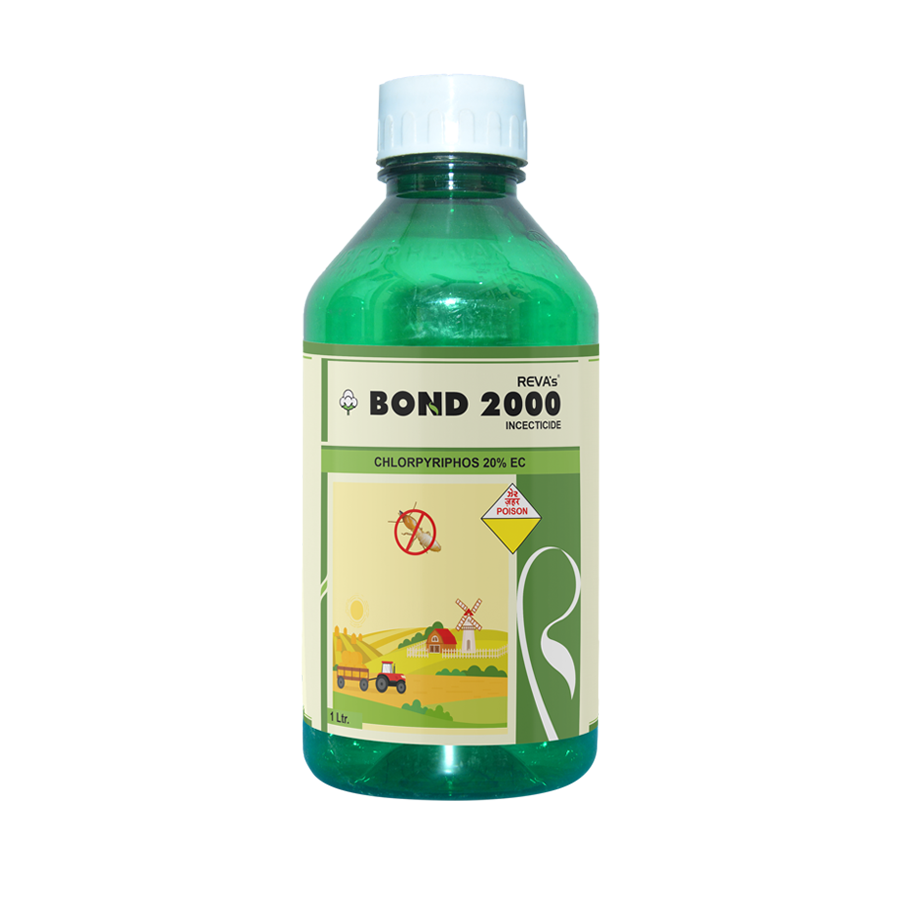Bond 2000
Bond 2000
Chlorpyriphos 20% E.C

It is a contact and stomach poisonous emulsifiable
concentrate formulation based on chlorpyriphos technical.
*Caution : Toxic to aquatic organisms hence should not be used near water bodies,
aquaculture or pisciculture. It is toxic to honeybees, spray application should be
avoided during foraging period of bees. Product is highly toxic to birds hence avoid use
near bird habitat.
Recommendation
| Crop(s) | Common Name of Pest | Dosage/HA | Dilution in Water (lit) | Waiting Period between last spray to harvest (in days) | Re-entry after each Applicatio n (In Hours) | |
| AI (gm %) | Formulation (ml) | |||||
| A- Non croped area | ||||||
| 1. Wheat | 3-4 ml/kg seed | |||||
| 2. Soil treatment | -- | -- | -- | -- | -- | |
| 1. Buildings | (Pre & Post construction treatment) | 1% a.i. | ||||
| Cotton | Aphid,Boll worm, White fly | 250 | 1250 | 500-1000 | ||
| Cut Worm | 750 | 3750 | 500-1000 | |||
| Wheat | 2-3 ltrs. / ha | -- | -- | -- | -- | |
| Gram | 15-30 ml/kg seed | |||||
| 2. Forestry | 1%a.i. | |||||
| Barley | 4-6 ml/kg seed | |||||
| Tabacco | Ground beetle | 350 | 1750 | 500-1000 | ||
| termite Control | ||||||
| Paddy | Hispa | 250 | 1250 | 500-1000 | ||
| Leaf roller | 375 | 1875 | 500-1000 | |||
| Gall midge,Stem borer,whorl maggot | 250 | 1250 | 500-1000 | |||
| Citrus | Black Citrus, Aphid | 0.02% | 1500-2000 | 1500-2000 | ||
| Cabbage | Diamond Backmoth | 400 | 2000 | 500-1000 | ||
| Onion | Root grub | 1000 | 5000 | 500-1000 | ||
| B-Cropped area | ||||||
| Ber | Leaf hopper | 0.03% | 2250-3000 | 1500-2000 | ||
| Brinjal | Shoot & fruit borer | 200 | 1000 | 500-1000 | ||
| Apple | Aphid | 0.05% | 3750-5000 | 1500-2000 | ||
| Beans | pod borer, Black bug | 600 | 3000 | 500-1000 | ||
Direction Of Use
P.P. Equipment:-P.P. Equipment:-Knapsack sprayer, foot sprayer, compression knapsack sprayer, compression knapsack battery sprayer and ASPEE-HTP power sprayer
Time of Application
-
Precautions
- Keep away from foodstuffs, empty foodstuff containers and animals food.
- Avoid contact with mouth, eyes and skin.
- Avoid inhalation the spray mist. Spray in the direction of wind.
- Wash thoroughly the contaminated clothes and parts of the body after spraying.
- Do not smoke, drink, eat and chew anything while spraying.
- Wear full protective clothing while mixing and spraying.
Symptoms Of Poisoning
Headache, giddiness, vertigo,nausea, vomiting, blurred vision, diarrhoea, convulsions, sweating, excessive lacrimation, and salivation may occur.
First Aid
- If swallowed, induce vomiting by tickling the back of throat. Repeat it until the vomitus is clear. Do not induce vomiting if the patient is unconscious.
- If clothing and skin are contaminated, remove the clothes and wash the contaminated skin with copious amount of soap and water.
- If eyes are contaiminated, flush with plenty of saline/clean water for about 10 to 15 minutes.
- If inhaled, remove the patient to fresh air.
Phytotoxicity
The product is not phytotoxic when used as per field recommendation.
Antidote
- Atropinize the patient immediately and maintain full atropinization by repeated doses of 2 to 4 mg. of atropine sulphate intravenously at 5 to 10 minutes interval. As much as 25 to 50 mg. of atropine may be required in a day. The need for further atropine administration is guided by the continuance of symptoms. Extent of salivation is a useful criterion for dose adjustment.
- Dissolve 1-2 gm of 2 PAM in 10 ml distilled water and inject intravenously very slowly for 10-15 minutes.
Disposal Of Used Container
- It shall be the duty of manufactures formulators and operator to dispose packages or surplus materials and washings from the machine and container shall be disposed off in a safe manner so as to prevent environmental and water. pollution.
- The used packages shall not be left outside to prevent their re-use.
- Packages shall be broken and burried away from habitation.
Storage Conditions
- The pesticides shall be stored in separate rooms or primeses away from the rooms or promises used for storing other articles or shall be kept in separate almirahs under lock and key depending upon the quantity and nature of the insecticides
- The rooms or premises meant for storing the insecticide shall be well built, dry, well lit and ventilation and of sufficient dimension to avoid contamination with vapour
